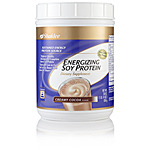Tips for creating nutritious & delicious treats that you and your family will enjoy all summer long.
Often times when we think of enjoying a treat, we may think of words like, indulging. Actually when I looked up the definition of indulge, the sentence summed it up!
in-dulge
verb
allow oneself to enjoy the pleasure of.
Example sentence: "we indulged in some hot fudge sundaes"
I'm forever seeking tricks to creating healthy treats that not only taste delicious but offer little guilt~ and honestly, knowing the treats are healthy, I'm ok with a little indulgence-often!
One of the best tips I've learned for making treats healthy is to add protein to a snack or treat as the protein will help to fill us up~therefore, we typically eat less. I look to add plant proteins like nuts, seeds, beans, legumes, soy, etc. I've also learned that if I make the treat look like other, "indulgences" I seem to enjoy it more, and so does my family!
Here's a couple recipes that feel like you may have indulged but truly you are eating a healthy snack~
 |
| Blueberry Sundae Delight |
Put 1/4 cup plain yogurt in bottom of sundae glass (I use plain greek yogurt as it offers low sugars and high protein)
Add 1 scoop protein powder (I use Shaklee Life protein powder as it is natural, non-gmo, and truly delicious).
Top with another 1/4 cup of plain yogurt
Add a handful of blueberries or any berries!
Add a dollop of Truwhip
Add a cherry!
~ENJOY~
Packed with protein, this treat is very easy to make and seriously delicious and if I do say so myself, beautiful!
Craving chocolate or love coconut? This is another favorite:
 |
| Coconut Chip Sundae Dream |
Simply layer the protein powder between yogurt and top with chocolate chips, coconut & a cherry!
You could definitely add nuts, seeds, other berries, bananas, etc. I'd love to know how you would create a healthy sundae! What toppings or ingredients would you add in?
Below are a few of my favorite, "indulgent" products!
 |
| Shaklee Life Protein Powder |
 |
| A yummy and healthier alternative to other whip toppings. |
 |
| Stonyfield Organic Greek Yogurt |










